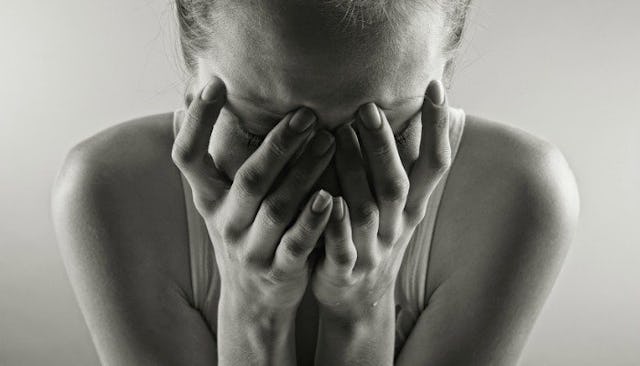Scary Mommy Confessions: I Worried That I Hated My Baby

I was talking on the phone to my brother the other day. He has a 7-month-old and a toddler, so he and his wife are at the epicenter of newborn hell. We talked for a while about the shitstorm that is life with a newborn and a toddler, and the mind-altering delirium of sleep deprivation. I agreed it can pretty rough, and parenting isn’t like the pretty pictures of magazine ads or Facebook photos.
“It’s really awful,” he said. “I’ve been…I don’t know…it’s just that…”
He stammered a bit, and I could tell there was something he didn’t want to say or didn’t know how to say.
“You’re thinking unkind thoughts, aren’t you?” I offered for him.
“Yes!” he agreed, but didn’t say more.
But he didn’t need to say more. I know what it feels like to have unkind thoughts. I know what it feels like to have downright hateful thoughts. I know what it feels like to have thoughts so dark and horrible that they terrify you because you hadn’t thought you were capable of such disgusting views.
The first year or so after my son was born was incredibly difficult. Actually, difficult is an understatement; it was hell. The thoughts I had about myself, my life, and even my son were so horrible that I’ve kept them hidden for nearly 10 years. I haven’t been able to admit them to anyone, not even my husband or therapist. In fact, it wasn’t until last night when I was talking to my brother’s wife that I confessed the hateful thoughts I had all those years ago. Because at some point, I suppose, you have to let that shit go, especially if sharing your messy truth might help someone else feel a little less bad about their own.
You see, even though I wanted nothing more than to become a mother, after my oldest son was born, I completely regretted becoming a mother — not just now and then, but nearly every second of every day. I wished I could wrap him up and stuff him back in my womb for a while. I wanted my old life back, desperately. I’ve made a horrible mistake, my mind chanted on repeat. I want a do-over. I don’t want this. I don’t want any of this. I hate this life, I hate motherhood, and I hate you.
Even worse than that, there were times when I actually thought a tragedy — every other parent’s worst-case scenario — might not be so bad. Don’t get me wrong, I never wanted to hurt my baby, and I didn’t imagine hurting him, but there were times when I thought that if the worst were to happen — if I were to walk into his room and discover that he had stopped breathing — I would survive. I would be fine. I could go back to the life I had known before.
Every parent has their own worst fears. For many new parents, worst fears include things like illness, serious medical conditions, or even sudden infant death. But for me, my worst fear was that I was stuck living a life that I didn’t want, that I had made a horrible mistake. My worst fear was that the darkness of my own thoughts revealed the kind of mother I was, that my hateful thoughts meant I did not love my own child. I mean, what kind of mother imagines the unimaginable and is OK with it? What kind of mother wishes she wasn’t a mother? What kind of parent has such hateful thoughts about their own child?
All these years later I can now rationalize those awful thoughts as a combination of sleep deprivation, newborn hell, and postpartum depression. I can logically understand that horrible thoughts do not make someone a horrible mother. And I am able to remind myself that, despite my dark thoughts, my actions were loving.
But even though I am confident that I’m a good mother who loves my children dearly, and haven’t had such hateful thoughts since emerging from the depths of postpartum depression, part of me still hasn’t recovered from the shame of those thoughts. That’s why I’ve kept them to myself for nearly 10 years, getting by with vague descriptions of postpartum depression and the delirium of sleep deprivation.
But what I am realizing is that if I am going to help other parents feel less alone in the dark trenches of parenting, I need to be real, open, and specific about my own grittiness. If I’m going to work to remove the stigma of postpartum depression, I need to paint a full picture and give meaning to what it really looks like. And if I am going to move past the glossy images of parenthood, I need to share my own ugly, dark, and even scary truths.
Maybe by writing this, I can change my story from one of hateful thoughts to one of loving actions. Maybe by talking about this, we all can change the story from one of shame to one of acceptance. Maybe by being honest about the ugly thoughts and the dark places, we can change the story of motherhood from the glossy, romanticized version to the gritty, true version.
In the end, our unkind — or even hateful — thoughts don’t matter because love is more than a feeling or a thought. Love is an action, a way of carrying on in the midst of the good and the bad.